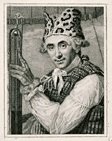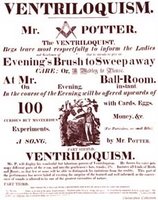Dr. John Jeffries: physician, Loyalist, aeronaut, part 3
Part 1 of this series of postings introduced Dr. John Jeffries, who, despite his family ties to Boston's establishment, became a Loyalist. Part 2 described his frustrated attempts to lobby for a higher post in London. In Feb 1783, George III officially declared his war with the new U.S. of A. over, leaving Jeffries in London as a Loyalist exile, a doctor with, apparently, a steady practice but no way to fulfill his ambitions for something greater.
Then, in June, the Montgolfier brothers launched their first large balloon in Paris. A series of technological advances quickly followed: a flight with animal passengers in September, a flight with human passengers in November, the first human flight with a hydrogen balloon in December. A small, energetic, and egocentric Frenchman named Jean Pierre Blanchard (shown above) started to imagine ways that such balloons could be steered in flight. Already republican in his politics, Blanchard thought he would find more patrons outside France, so he went to England.
The first balloon flight in Britain was performed by Vincent Lunardi in September 1784. The 18th-Century Reading Room blog offers his own account. Dr. Jeffries was intrigued. Seeing himself as a man of science, he saw a flaw in all the previous aerial voyages. Jeffries felt that ballooning could “lead…to a full investigation of the nature and properties of the atmosphere," but that published accounts of aerial voyages so far showed that the balloonists'
principal attention was turned to the facility and safety of an ascent; to the prospects below them, in their elevated situation; to the effects which so sudden a change of situation and air, might have on them personally; and to the power of ascending at pleasure, and with safety.He wanted to put aeronautics on a more scientific, less subjective footing.
Jeffries therefore approached Blanchard with a proposition: that two men should go up together, one attending to the balloon and the other to scientific instruments and observations. Blanchard, it became clear, hated to share any glory, but he needed a patron. He was a hydrogen balloonist, as opposed to a hot-air balloonist. With modern chemistry still in its infancy in the 1780s, scientists weren't sure what exactly distinguished these two forms of buoyancy. But it was clear that hydrogen balloons went higher and stayed up longer than the Montgolfiers' early hot-air balloons. It was also clear that launching a hydrogen balloon was terribly expensive: one needed large amount of sulphuric acid and iron filings to mix and release enough hydrogen gas. And the more men and equipment the balloon had to lift, the more hydrogen was necessary.
Blanchard therefore suggested a deal. As Jeffries later wrote:
I accordingly made application to M. Blanchard to indulge me with a feat with him in his next intended voyage; which indulgence I could not obtain of him, but in consideration of one hundred guineas presented him for that purpose.The hundred guineas was a large sum, but not the full cost of the voyage. For more money, Blanchard planned to sell tickets to the launching.
The need for a large audience, however, produced another obstacle—crowds had torn up the spectator areas when other balloons didn't take off for reasons of bad weather, not enough gas, rips in the fabric, &c. As Jeffries described it:
The disorder and mischief occasioned by two unsuccessful attempts, and the damage thereby done to individuals in their property, had made every one who had grounds of their own, or at their disposal, suitable for such an exhibition, in or near the metropolis, resolve against granting the use of them, on almost any consideration; and more than four weeks were lost in fruitless solicitations for a proper place to ascend from. . . . these disappointments were heightened by reflections on the season of the year; the small portion of day-light, which could at best be afforded us; the variableness of the weather...Time was running out for Blanchard and Jeffries.
Finally, the pair found a location at the Rhedarium Garden in London. They scheduled their ascent for Monday, 29 November, but that day proved “uncommonly tempestuous.” The next morning they tried again. “The operation of filling the Balloon was not begun until after eleven o’clock," which was the time Jeffries hoped the balloon would be full; "it was not until after two o’clock that we began to fasten the Car to the Balloon.” The men sent up a small balloon to gauge the direction of the wind—east southeast. At 2:34 PM, the balloon lifted the car over the railing of the inflation apparatus; men pulled it down to the launch area, and Blanchard and Jeffries climbed in.
Having loaded his equipment, Jeffries reported:
we attempted again to rise; but still with cords in the hands of people on the ground: But finding that we had too much ballast in proportion to the gaz in our Balloon, after alighting for a moment, on the pent-house of the stables, on the north side of the Rhedarium, and falling off towards the west end so near, as almost to touch the buildings, M. Blanchard threw out the remaining part of our sand ballast, on which we again rose; when, after striking against the top of a chimney with so much force, as to beat off the earthen tunnels on it, (which accident, I imagine was occasioned by the wind suddenly acting on the Balloon as it first arose above the Buildings, and before it had acquired a situation to be acted on equally as to its course, or its full velocity of ascent)—at 38 minutes after two, we rose above the reach of any further terrestrial obstructions.At last Dr. John Jeffries was flying. (See Part 4 for whether he came down.)




